Over the last few years, there have been more changes occurring across the enterprise than in any other market. The corporate world, which was once loath to even consider modifying roadmaps and buying new products without waiting years to see how they held up, has thrown those old models on their head. Now, more companies than ever are investing in new ideas and products.
Nowhere is that more evident than in the rapid adoption of tablets in the enterprise. From iPads to the Cisco Cius, there are countless products out there that companies are ready and willing to buy. Meanwhile, they’re looking elsewhere around the mobile space to see if there’s anything else worth considering.
As of late, the other mobile form factor worth considering is Ultrabooks. The thin, lightweight, notebook spec created by Intel has made a huge mark on the mobile market. And according to most analysts, in the coming years, they could very well become the most popular notebook form factor on the market.
But as the enterprise becomes more willing to adopt such devices, it’s also thinking about what it should buy right now. In the following slides, we’re going to examine that, and list the five tablets and five Ultrabooks IT decision-makers should be considering bringing to the office.
Apple’s new iPad, which is slated to hit store shelves on March 16, seems to be an ideal tablet option for today’s enterprise user. It’s the tablet that the vast majority of employees want, plus it combines the new A5X processor with the Retina Display to make it a notable step up over the iPad 2. Furthermore, its 4G LTE integration is ideal for employees who are on the road.
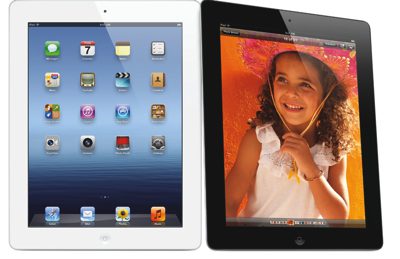
New iPad
The Acer Aspire S3 is one of the most powerful Ultrabooks on the market, boasting a 13.3-inch LED display, Intel’s Core i5 processor, and a design that will make any client take a second to admire when employees break it out of the bag. Plus, it’s running Windows 7, making it a potentially more useful device than a tablet alternative.
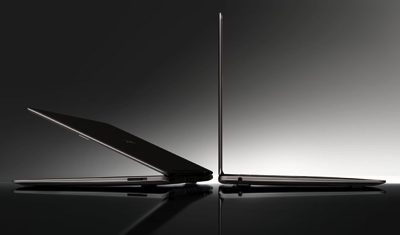
Acer Aspire S3
When Cisco launched the Cius last year, the company made it clear that it didn’t want its device to be an iPad killer. Instead, it hoped that enterprise users would see value in the Cius for its ability to be integrated into existing Cisco products. And although it’s Android-based, it comes with a host of security features that should allay at least some of the fears associated with the operating system.
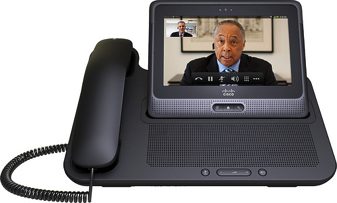
Cisco Cius
Next tablet: RIM Blackberry Playbook
The Asus Zenbook combines the key features that make Ultrabooks so special: power and mobility. The device comes with Intel’s Core i3, i5, or i7 processor, depending on the user’s preference, and boasts either an 11.6- or 13.3-inch display. Add that to its inclusion of a USB 3.0 port and Bluetooth 4.0, and it quickly becomes clear the Zenbook is one worth considering for the office this year.
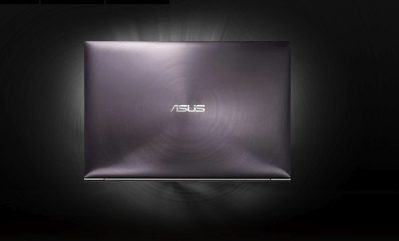
Image 4: Asus Zenbook
Next tablet: RIM Blackberry Playbook
Research In Motion has been suffering through an exceedingly difficult time over the last couple years as competitors deliver far more appealing devices. Still, the company’s 7-inch BlackBerry PlayBook is at least worth considering for IT decision-makers that are concerned about Android security and see little value in the iPad. And with its recent addition of native e-mail and contacts support, it’s far more appealing than it was previously.
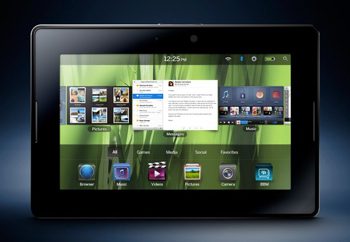
RIM Blackberry PlayBook
Next ultrabook: Sasmsung Galaxy
Although Dell has lost some of its popularity in the enterprise to companies like HP and Lenovo, the company still delivers a host of high-quality PCs for the corporate world. Chief among them might just be the Dell XPS 13. The Ultrabook boasts a beautifully simple design, and adds serious performance to make it one of the most attractive options in this roundup.
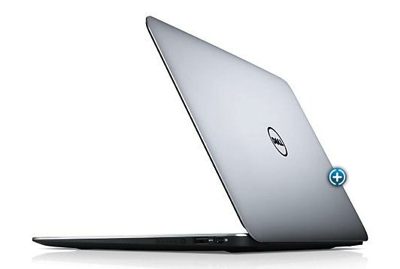
Dell XPS 13
Next ultrabook: Samsung Galaxy
Next ultrabook: Lenovo IdeaPad
The Samsung Galaxy Tab 10.1 is designed to be the Android-based alternative to Apple’s iPad. It comes with a 10.1-inch screen, 4G LTE connectivity, and an attractive price tag. That said, it’s designed with consumers in mind, and it lacks many of the security features found in the aforementioned Cisco Cius. So, while it might be a worthwhile option for some, it might turn others away.
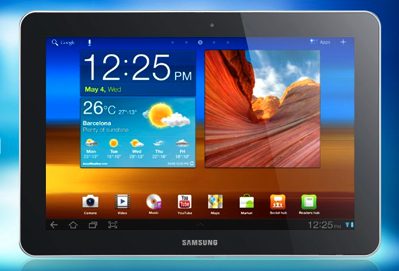
Galaxy Tab 101
Next ultrabook: Lenovo IdeaPad
Next ultrabook: Lenovo ThinkPad
Lenovo is one of the top PC makers for enterprise users, and its IdeaPad U300 helps the company continue to appeal to those folks. The device comes with the thin, lightweight design expected from an Ultrabook, and features up to 8 hours of battery life, making it a great option for travelers. Plus, it’s optional 256GB solid-state drive is enough to make any IT decision-maker happy.
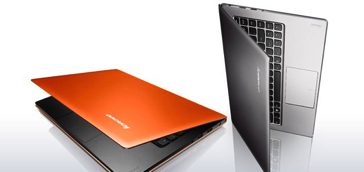
IdeaPad U300
Next ultrabook: Lenovo ThinkPad
Next ultrabook: Apple Macbook Air
Lenovo’s ThinkPad tablet is a unique option for enterprise customers. The device, which is scheduled to get an update to Android 4.0 (Ice Cream Sandwich) in May, works with a stylus. Even better, it can be docked into a keyboard, letting users turn it into a quasi-notebook. Think of the ThinkPad tablet as a half-tablet, half-Ultrabook hybrid. Not bad, right?
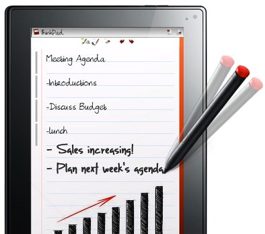
Lenovo ThinkPad
Next ultrabook: Apple Macbook Air
Previous ultrabook: Lenovo ThinkPad
OK, OK, so the MacBook Air isn’t exactly an Ultrabook. But let’s not forget that Apple’s thin notebook was the device that inspired Intel’s new spec. It’s also the device that could greatly impact the adoption of Ultrabooks. So, why might the MacBook Air appeal to enterprise users? It’s well-designed, secure, and perhaps most importantly, benefits from consumerization.
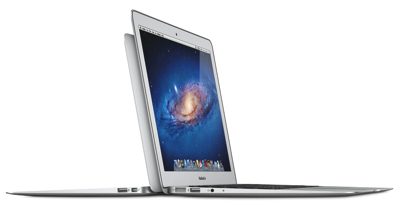
Macbook Air
Previous ultrabook: Lenovo ThinkPad
Ethics and Artificial Intelligence: Driving Greater Equality
FEATURE | By James Maguire,
December 16, 2020
AI vs. Machine Learning vs. Deep Learning
FEATURE | By Cynthia Harvey,
December 11, 2020
Huawei’s AI Update: Things Are Moving Faster Than We Think
FEATURE | By Rob Enderle,
December 04, 2020
Keeping Machine Learning Algorithms Honest in the ‘Ethics-First’ Era
ARTIFICIAL INTELLIGENCE | By Guest Author,
November 18, 2020
Key Trends in Chatbots and RPA
FEATURE | By Guest Author,
November 10, 2020
FEATURE | By Samuel Greengard,
November 05, 2020
ARTIFICIAL INTELLIGENCE | By Guest Author,
November 02, 2020
How Intel’s Work With Autonomous Cars Could Redefine General Purpose AI
ARTIFICIAL INTELLIGENCE | By Rob Enderle,
October 29, 2020
Dell Technologies World: Weaving Together Human And Machine Interaction For AI And Robotics
ARTIFICIAL INTELLIGENCE | By Rob Enderle,
October 23, 2020
The Super Moderator, or How IBM Project Debater Could Save Social Media
FEATURE | By Rob Enderle,
October 16, 2020
FEATURE | By Cynthia Harvey,
October 07, 2020
ARTIFICIAL INTELLIGENCE | By Guest Author,
October 05, 2020
CIOs Discuss the Promise of AI and Data Science
FEATURE | By Guest Author,
September 25, 2020
Microsoft Is Building An AI Product That Could Predict The Future
FEATURE | By Rob Enderle,
September 25, 2020
Top 10 Machine Learning Companies 2021
FEATURE | By Cynthia Harvey,
September 22, 2020
NVIDIA and ARM: Massively Changing The AI Landscape
ARTIFICIAL INTELLIGENCE | By Rob Enderle,
September 18, 2020
Continuous Intelligence: Expert Discussion [Video and Podcast]
ARTIFICIAL INTELLIGENCE | By James Maguire,
September 14, 2020
Artificial Intelligence: Governance and Ethics [Video]
ARTIFICIAL INTELLIGENCE | By James Maguire,
September 13, 2020
IBM Watson At The US Open: Showcasing The Power Of A Mature Enterprise-Class AI
FEATURE | By Rob Enderle,
September 11, 2020
Artificial Intelligence: Perception vs. Reality
FEATURE | By James Maguire,
September 09, 2020

Datamation is the leading industry resource for B2B data professionals and technology buyers. Datamation's focus is on providing insight into the latest trends and innovation in AI, data security, big data, and more, along with in-depth product recommendations and comparisons. More than 1.7M users gain insight and guidance from Datamation every year.
Advertise with TechnologyAdvice on Datamation and our other data and technology-focused platforms.
Advertise with Us
Property of TechnologyAdvice.
© 2025 TechnologyAdvice. All Rights Reserved
Advertiser Disclosure: Some of the products that appear on this
site are from companies from which TechnologyAdvice receives
compensation. This compensation may impact how and where products
appear on this site including, for example, the order in which
they appear. TechnologyAdvice does not include all companies
or all types of products available in the marketplace.